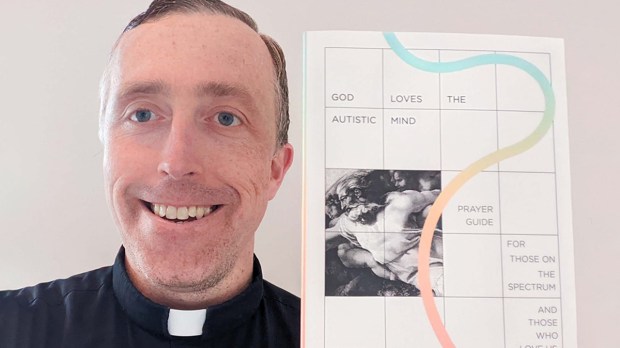Moral theologian and writer Fr. Matthew Schneider has acquired a following over the last few years on social media, and has written on a wide variety of topics.But he’s best known for how he’s embraced his neurodiversity and the way he’s encouraging others to do the same.
Fr. Schneider recently partnered with Pauline Books and Media to release a much-anticipated prayer book called God Loves the Autistic Mind: For Those on the Spectrum and Those Who Love Us (available at Amazon, too!).
I spoke with Fr. Schneider to talk about this exciting project.
Sarah Robsdottir: What inspired you to write this particular book?
Fr. Schneider: After I was diagnosed with autism — in my 30s, after my first year of ministry when fellow priests noticed that I consistently failed to recognize the emotions on children’s faces — I started reading up on autism. I read through a whole shelf or more of books. After I read the first wave, I tried to find books on Christian ministry geared toward those on the spectrum, specifically books on autistic prayer. I thought that with all the information out there on the subject, something would exist. But I was greatly disappointed.
A few people had written accessibility guides for churches and a few moms had self-published books on the prayers they say for their autistic children. But I noticed there was nothing for autistics themselves – nothing that wouldhelp us leverage our distinct traits in order to strengthen our prayer lives. In short, I felt the nudge of the Holy Spirit and got to work, although the initial inspiration and actual writing were a few years apart.
What makes your book specific to people with autism? And would those with Asperger’s syndrome benefit from reading it as well?
In the past decade, changes have been made in the way doctors diagnose autism. Yes – someone with Asperger’s syndrome (a form of neurodiversity now included under the autism spectrum disorder [ASD] diagnosis and referred to as ASD without intellectual or language impairment) would benefit from this book.
In regard to how this book is specific to autistics: The overall structure of autistic prayer is similar to neurotypical prayer, only with some variation in the details. For example, autistics often have a hard time sitting still; we tend to fiddle with our hands or rock back and forth in a process called “stimming.” I talk about how this behavior, often regarded as a setback, can be an opportunity; how stimming can actually be a powerful meditative aid in prayer, rather than a detriment.
In addition, autistics often relate to Sacred Scripture in an atypical way. We may visualize a Bible scene by focusing more on details and less on the overall picture. I discuss how this is a powerful attribute to embrace, one that can lead to a unique understanding of the text.
What are a few key “take-aways” you hope readers gain from your book?
When we pray, we are open before God in our abilities and our disabilities. While autism certainly has some disabling aspects, it also provides special advantages; and even those disabling aspects can be steppingstones to spiritual growth when directed properly.
Near the beginning of my research process, I interviewed about two dozen autistic Christians to gather a wide variety of examples of spiritual and meditative habits that strengthened their prayer lives. The result was a body of evidence proving that autistics can pray. This may not seem like a big deal, but there are a lot of voices out there that appear to suggest otherwise.
Are there any saints or Catholic heroes you relate to, specifically in regard to being on the spectrum?
I mention a few saints with autistic traits in the book. Historically, psychologists didn’t diagnose in the same way they do today, so I just focus on traits. St. Thomas Aquinas, for example, seems to have been very particular about certain subjects; it was noted that he could get so focused on special interests that he could lose track of his environment (these are classic autistic traits). Servant of God Léonie Martin, the sister of St. Therese, was very gullible and often had tantrums over sensory issues as a child. St. Thorlák was known to often take words very literally and as a child tended to have relationships with those older or younger and not with his peers (another typical autistic trait).
A friend’s teenage son was recently diagnosed with autism and the news has been difficult for them to handle. Do you have any words of wisdom or comfort to offer them, as well as to families in similar situations?
Take heart, because God loves the autistic mind! While living life on the spectrum comes with unique challenges, God will give you many graces to navigate the path before you, especially if you devote yourself to prayer. God speaks to the autistic mind in a special language. It’s my prayer that this book will help you hear His voice.
* * *
God Loves the Autistic Mind: For Those on the Spectrum and Those Who Love Us.’ (224 pages)is available in paperback and Kindle at Pauline Books and on Amazon.com. To keep up with Fr. Schneider, follow him on his website and on Twitter.



